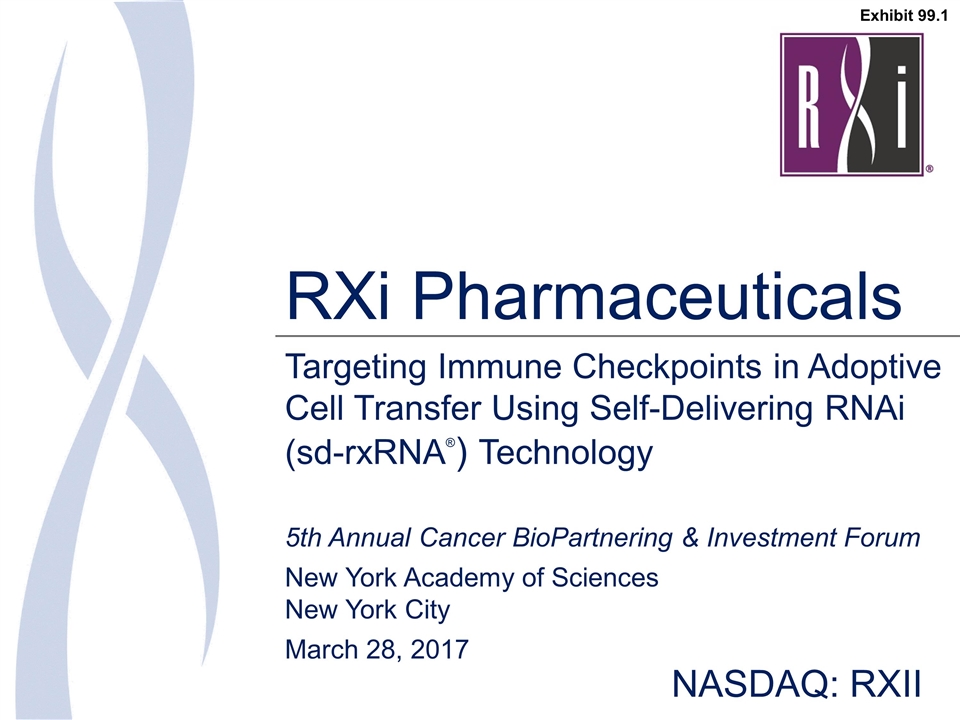
RXi Pharmaceuticals NASDAQ: RXII Targeting Immune Checkpoints in Adoptive Cell Transfer Using Self-Delivering RNAi (sd-rxRNA®) Technology 5th Annual Cancer BioPartnering & Investment Forum New York Academy of Sciences New York City March 28, 2017 Exhibit 99.1
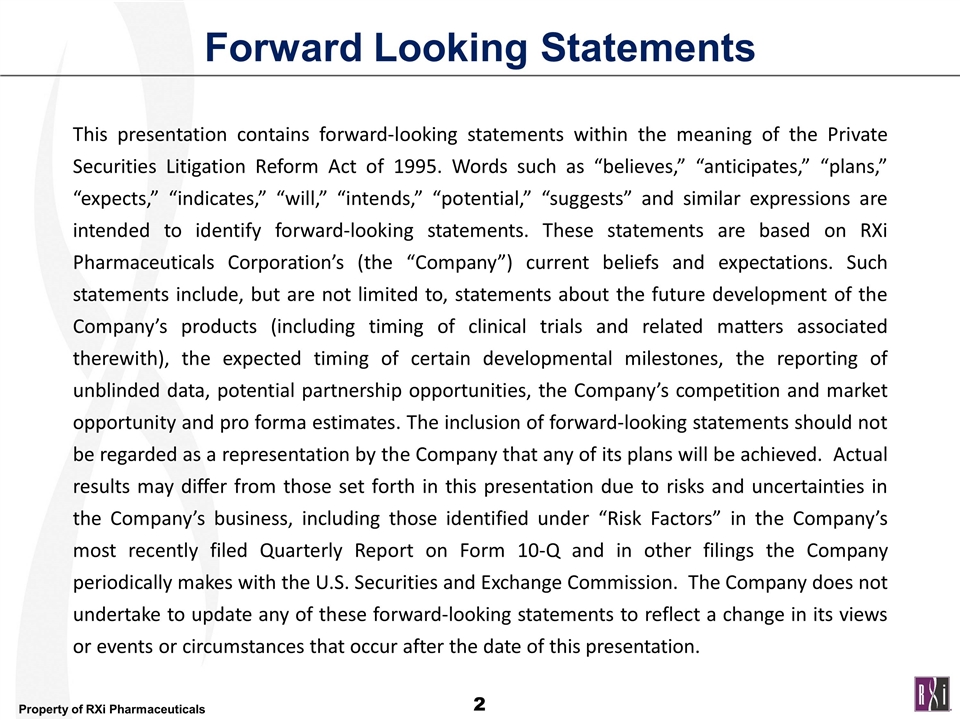
Forward Looking Statements This presentation contains forward-looking statements within the meaning of the Private Securities Litigation Reform Act of 1995. Words such as “believes,” “anticipates,” “plans,” “expects,” “indicates,” “will,” “intends,” “potential,” “suggests” and similar expressions are intended to identify forward-looking statements. These statements are based on RXi Pharmaceuticals Corporation’s (the “Company”) current beliefs and expectations. Such statements include, but are not limited to, statements about the future development of the Company’s products (including timing of clinical trials and related matters associated therewith), the expected timing of certain developmental milestones, the reporting of unblinded data, potential partnership opportunities, the Company’s competition and market opportunity and pro forma estimates. The inclusion of forward-looking statements should not be regarded as a representation by the Company that any of its plans will be achieved. Actual results may differ from those set forth in this presentation due to risks and uncertainties in the Company’s business, including those identified under “Risk Factors” in the Company’s most recently filed Quarterly Report on Form 10-Q and in other filings the Company periodically makes with the U.S. Securities and Exchange Commission. The Company does not undertake to update any of these forward-looking statements to reflect a change in its views or events or circumstances that occur after the date of this presentation.
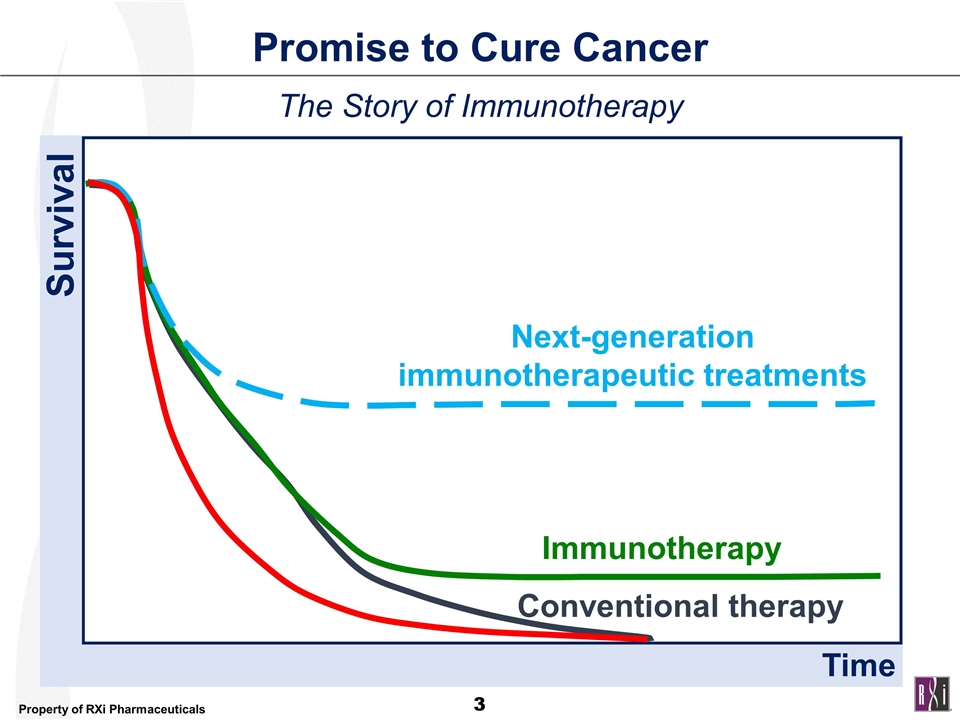
Promise to Cure Cancer The Story of Immunotherapy Survival Conventional therapy Immunotherapy Time Next-generation immunotherapeutic treatments
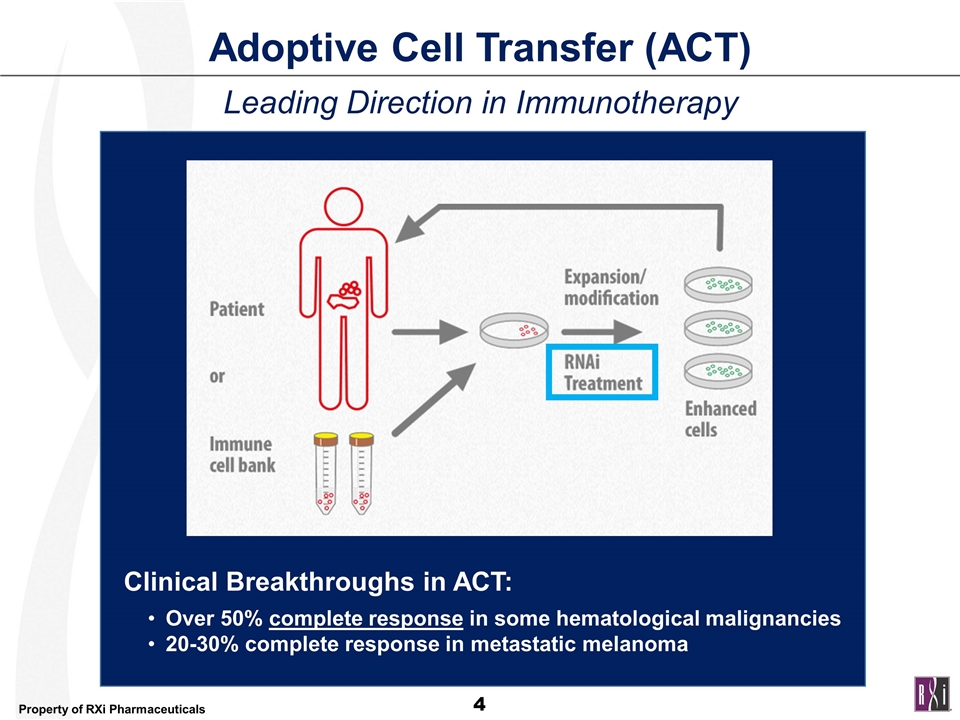
Adoptive Cell Transfer (ACT) Leading Direction in Immunotherapy Clinical Breakthroughs in ACT: Over 50% complete response in some hematological malignancies 20-30% complete response in metastatic melanoma
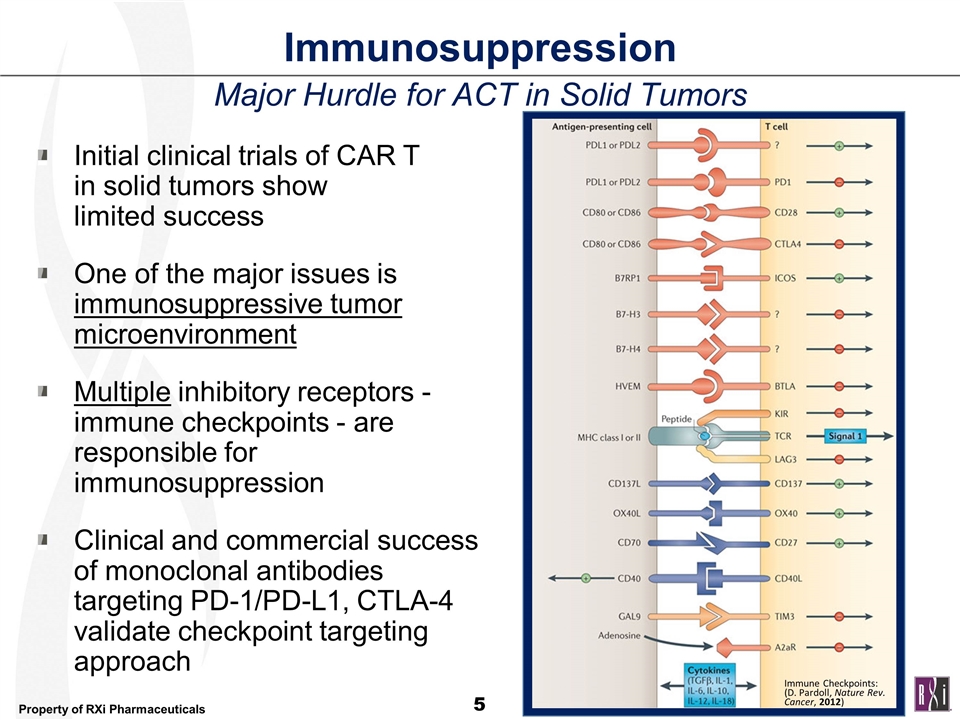
Immunosuppression Major Hurdle for ACT in Solid Tumors Initial clinical trials of CAR T in solid tumors show limited success One of the major issues is immunosuppressive tumor microenvironment Multiple inhibitory receptors - immune checkpoints - are responsible for immunosuppression Clinical and commercial success of monoclonal antibodies targeting PD-1/PD-L1, CTLA-4 validate checkpoint targeting approach Immune Checkpoints: (D. Pardoll, Nature Rev. Cancer, 2012)
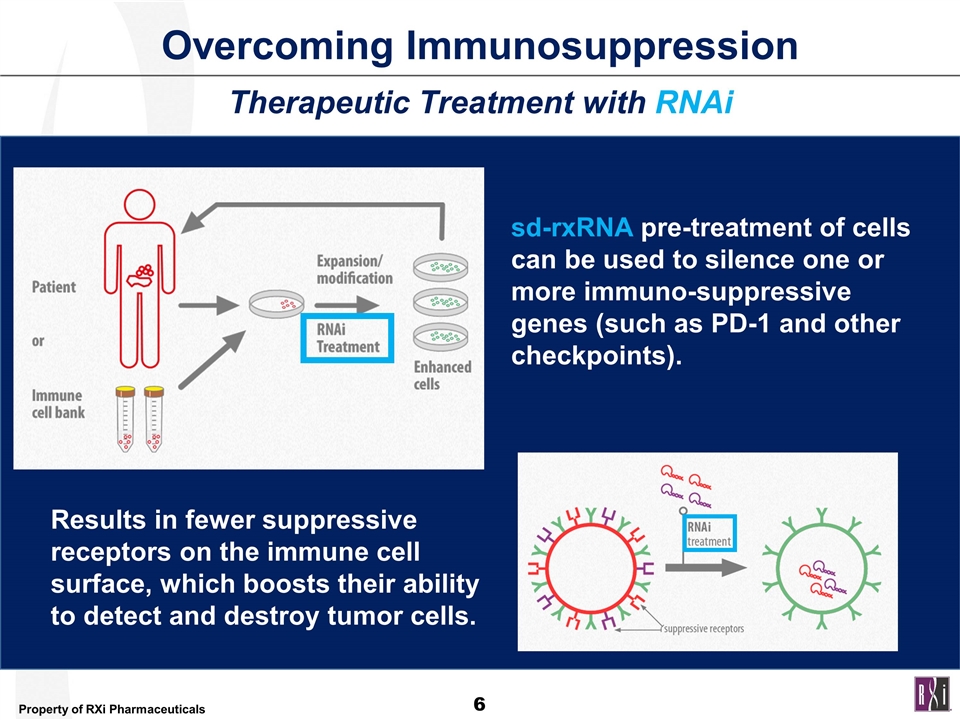
Overcoming Immunosuppression sd-rxRNA pre-treatment of cells can be used to silence one or more immuno-suppressive genes (such as PD-1 and other checkpoints). Results in fewer suppressive receptors on the immune cell surface, which boosts their ability to detect and destroy tumor cells. Therapeutic Treatment with RNAi
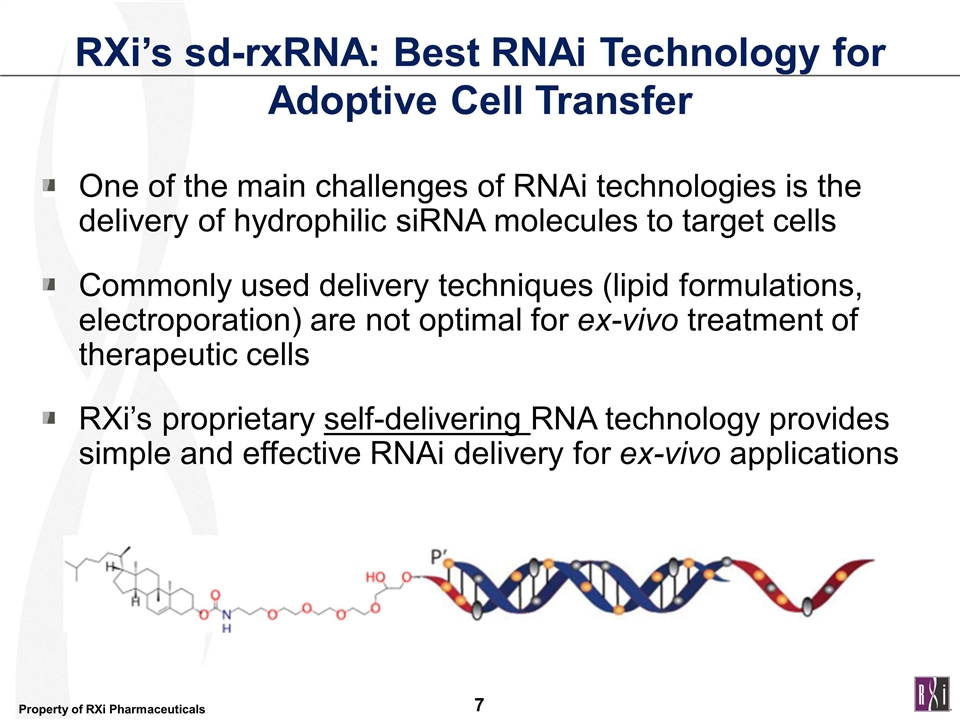
RXi’s sd-rxRNA: Best RNAi Technology for Adoptive Cell Transfer One of the main challenges of RNAi technologies is the delivery of hydrophilic siRNA molecules to target cells Commonly used delivery techniques (lipid formulations, electroporation) are not optimal for ex-vivo treatment of therapeutic cells RXi’s proprietary self-delivering RNA technology provides simple and effective RNAi delivery for ex-vivo applications
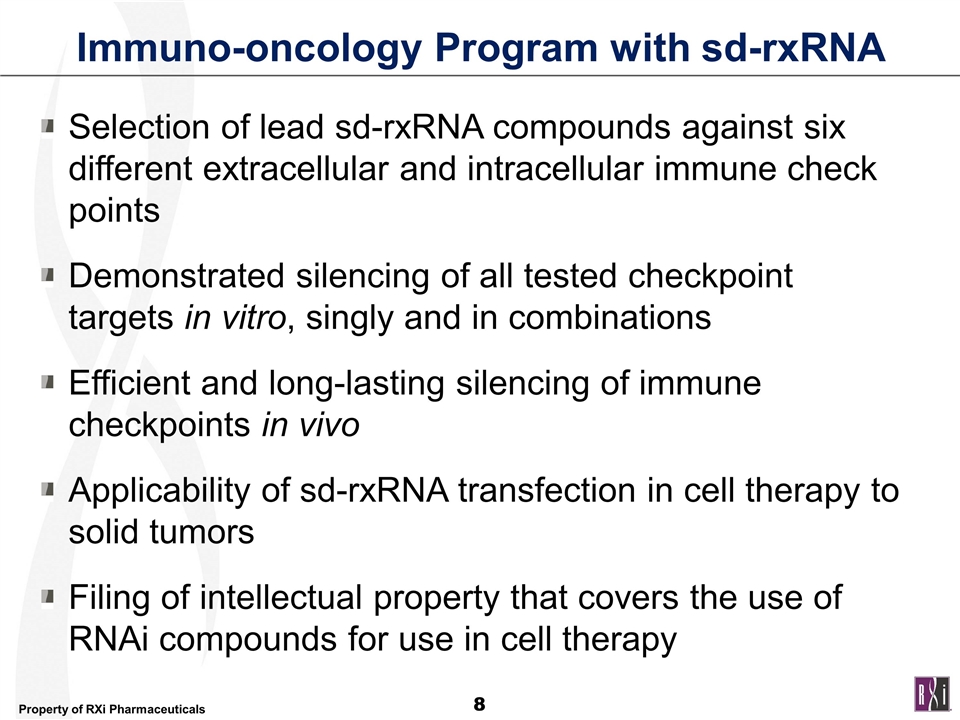
Immuno-oncology Program with sd-rxRNA Selection of lead sd-rxRNA compounds against six different extracellular and intracellular immune check points Demonstrated silencing of all tested checkpoint targets in vitro, singly and in combinations Efficient and long-lasting silencing of immune checkpoints in vivo Applicability of sd-rxRNA transfection in cell therapy to solid tumors Filing of intellectual property that covers the use of RNAi compounds for use in cell therapy
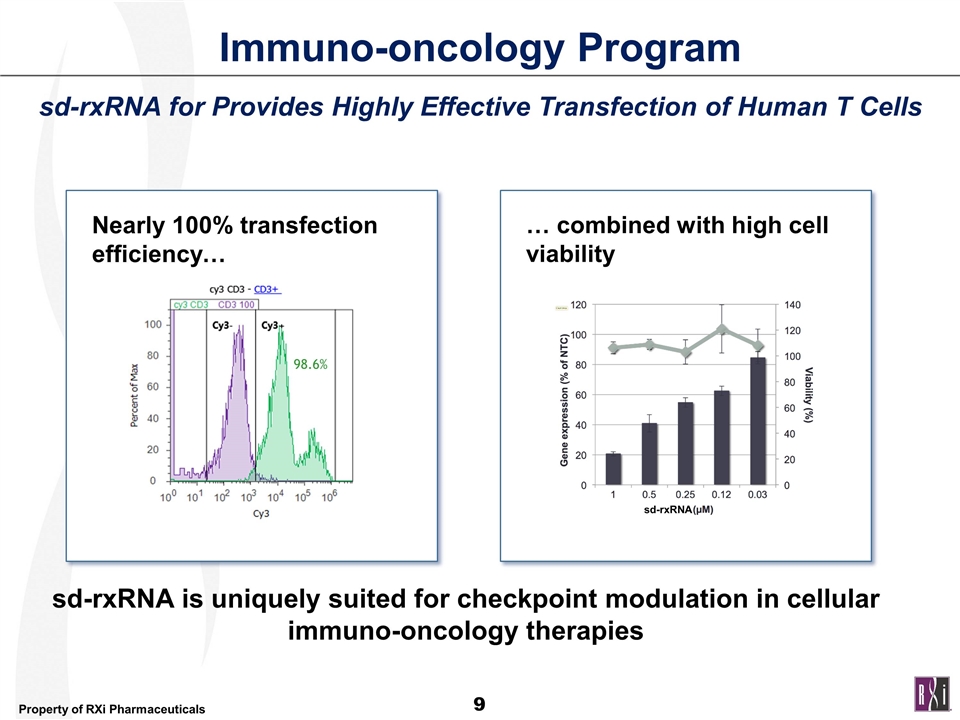
Immuno-oncology Program Nearly 100% transfection efficiency… sd-rxRNA is uniquely suited for checkpoint modulation in cellular immuno-oncology therapies 98.6% … combined with high cell viability sd-rxRNA sd-rxRNA for Provides Highly Effective Transfection of Human T Cells
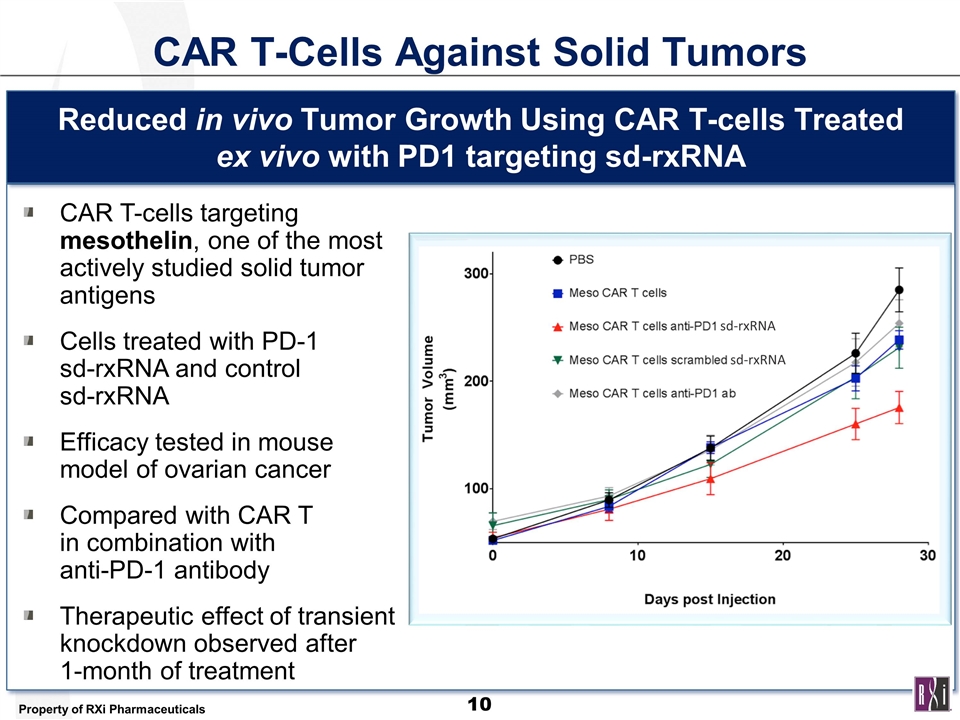
CAR T-Cells Against Solid Tumors CAR T-cells targeting mesothelin, one of the most actively studied solid tumor antigens Cells treated with PD-1 sd-rxRNA and control sd-rxRNA Efficacy tested in mouse model of ovarian cancer Compared with CAR T in combination with anti-PD-1 antibody Therapeutic effect of transient knockdown observed after 1-month of treatment Reduced in vivo Tumor Growth Using CAR T-cells Treated ex vivo with PD1 targeting sd-rxRNA sd-rxRNA sd-rxRNA
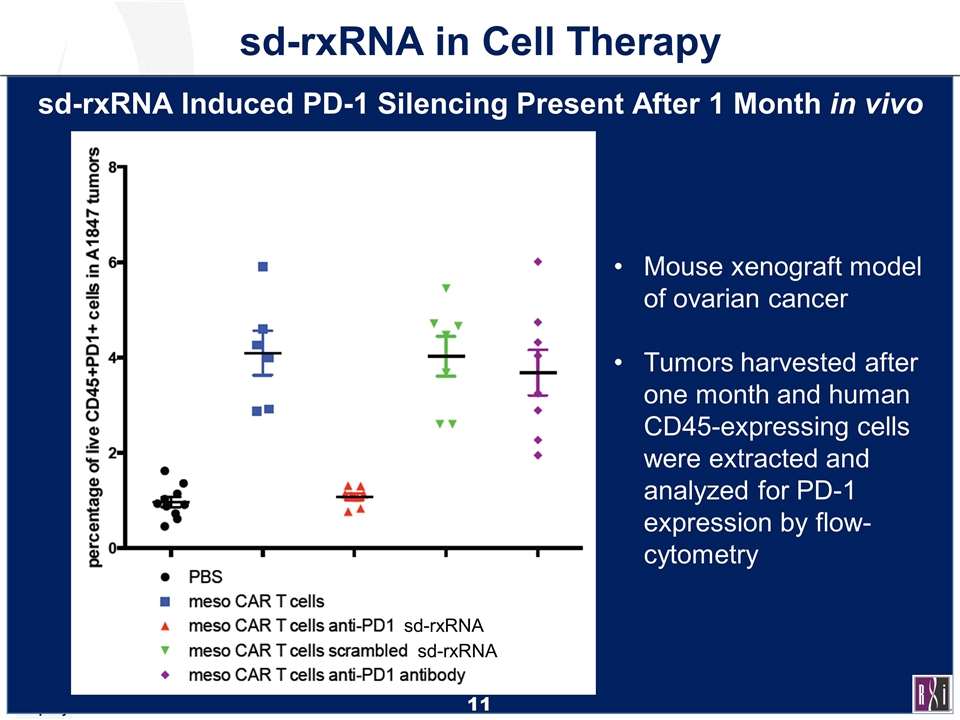
sd-rxRNA sd-rxRNA sd-rxRNA in Cell Therapy sd-rxRNA Induced PD-1 Silencing Present After 1 Month in vivo Mouse xenograft model of ovarian cancer Tumors harvested after one month and human CD45-expressing cells were extracted and analyzed for PD-1 expression by flow-cytometry
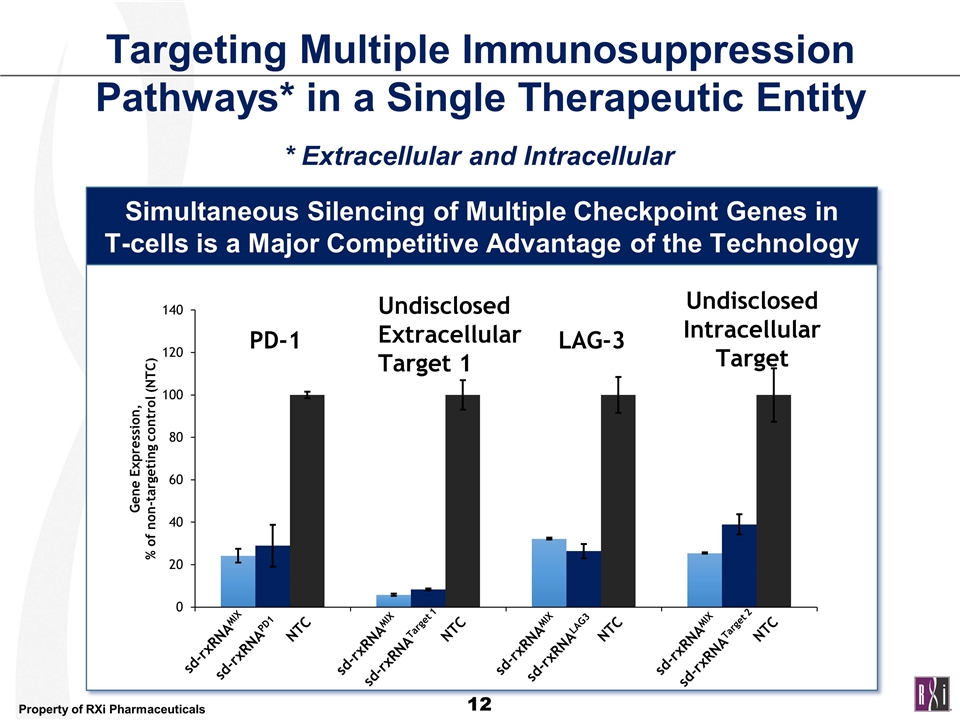
Targeting Multiple Immunosuppression Pathways* in a Single Therapeutic Entity * Extracellular and Intracellular Simultaneous Silencing of Multiple Checkpoint Genes in T-cells is a Major Competitive Advantage of the Technology sd-rxRNAMIX sd-rxRNAPD1 sd-rxRNATarget 1 sd-rxRNALAG3 sd-rxRNATarget 2 NTC NTC NTC NTC PD-1 Undisclosed Extracellular Target 1 LAG-3 UndisclosedIntracellular Target sd-rxRNAMIX sd-rxRNAMIX sd-rxRNAMIX
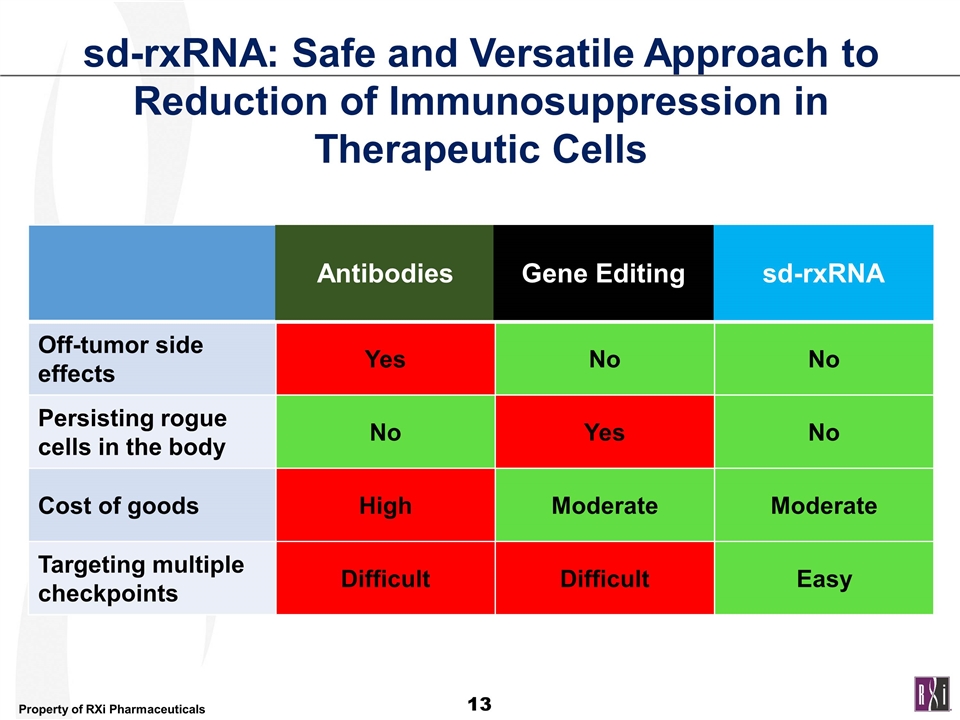
Off-tumor side effects Yes No No Persisting rogue cells in the body No Yes No Cost of goods High Moderate Moderate Targeting multiple checkpoints Difficult Difficult Easy sd-rxRNA: Safe and Versatile Approach to Reduction of Immunosuppression in Therapeutic Cells Antibodies Gene Editing sd-rxRNA
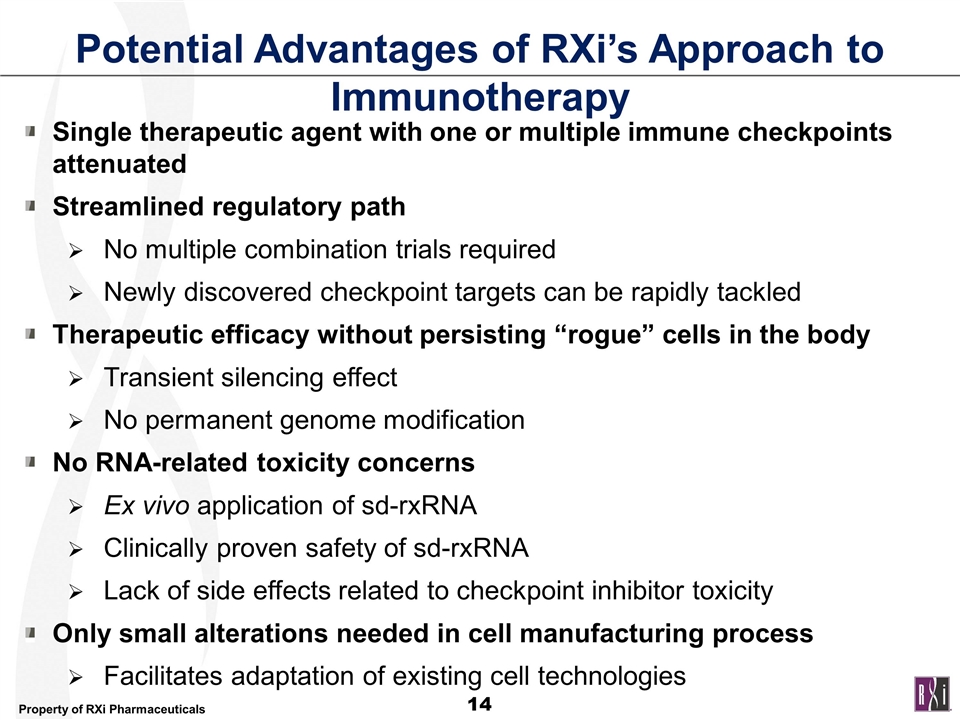
Potential Advantages of RXi’s Approach to Immunotherapy Single therapeutic agent with one or multiple immune checkpoints attenuated Streamlined regulatory path No multiple combination trials required Newly discovered checkpoint targets can be rapidly tackled Therapeutic efficacy without persisting “rogue” cells in the body Transient silencing effect No permanent genome modification No RNA-related toxicity concerns Ex vivo application of sd-rxRNA Clinically proven safety of sd-rxRNA Lack of side effects related to checkpoint inhibitor toxicity Only small alterations needed in cell manufacturing process Facilitates adaptation of existing cell technologies
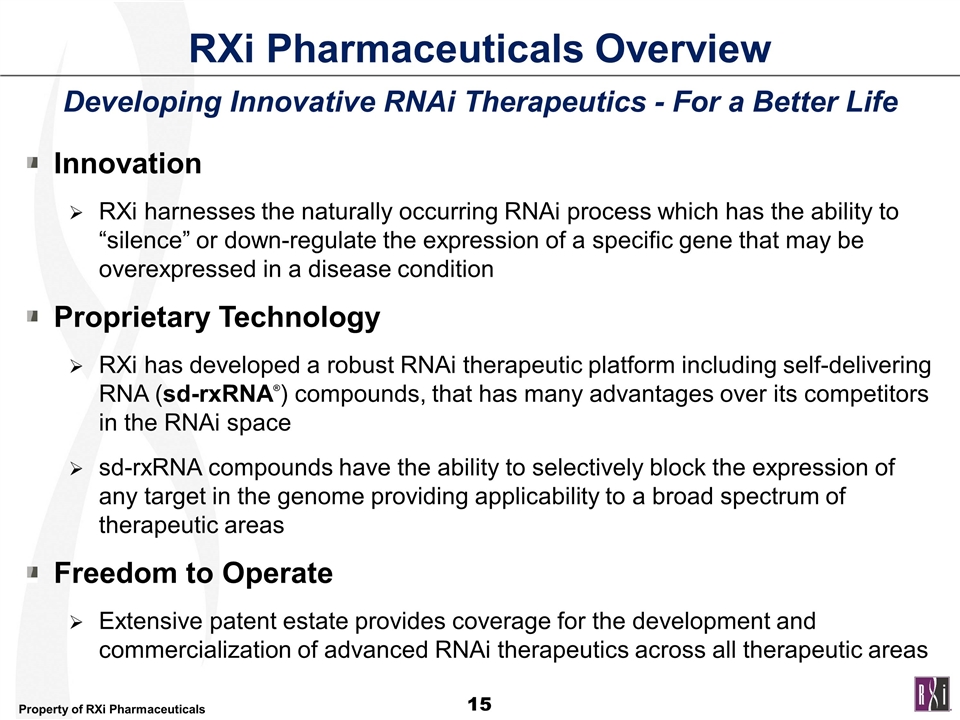
RXi Pharmaceuticals Overview Innovation RXi harnesses the naturally occurring RNAi process which has the ability to “silence” or down-regulate the expression of a specific gene that may be overexpressed in a disease condition Proprietary Technology RXi has developed a robust RNAi therapeutic platform including self-delivering RNA (sd-rxRNA®) compounds, that has many advantages over its competitors in the RNAi space sd-rxRNA compounds have the ability to selectively block the expression of any target in the genome providing applicability to a broad spectrum of therapeutic areas Freedom to Operate Extensive patent estate provides coverage for the development and commercialization of advanced RNAi therapeutics across all therapeutic areas Developing Innovative RNAi Therapeutics - For a Better Life














